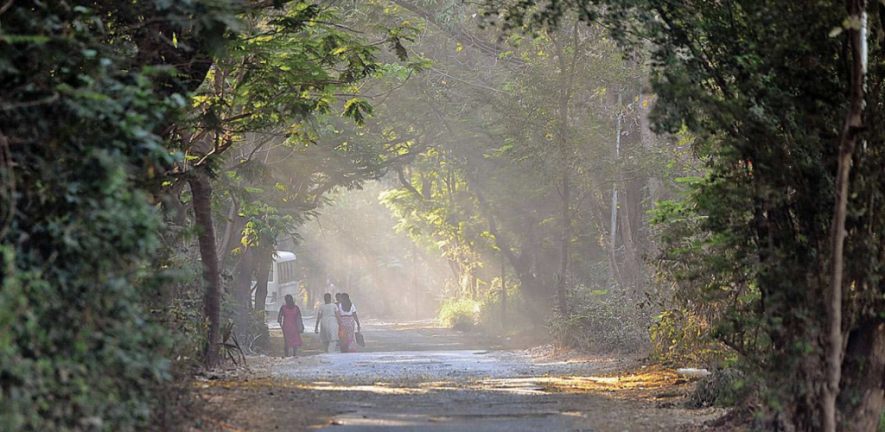SC Directs Expeditious Listing by Bombay HC of Adivasi Claims for Forest Rights at Aarey

ON Friday, a Supreme Court Bench comprising Chief Justice of India (CJI) Dr D.Y. Chandrachud and Justices P.S. Narasimha and J.B. Pardiwala, in the case of Re: Felling of trees in Aarey forest (Maharashtra), granted liberty to an Adivasi agriculturist to pursue the claim of his rights as a ‘forest dweller’ under the Scheduled Tribes and Other Traditional Forest Dwellers (Recognition of Forest Rights) Act, 2006 at the Bombay High Court. The plea of the Adivasi agriculturist, to be recognised as a ‘forest dweller’ under the Act, is pending before the high court.
Interlocutory applications (IAs) were filed by the Adivasi agriculturist, who prayed to be allowed to intervene and argue his objections in a clarification application filed by the Mumbai Metro Rail Corporation Limited (MMRCL) for the purpose of cutting 177 trees in order to prepare the shunting area of the Mumbai Metro 3 Project, which shall, according to him, directly impact his livelihood and life.
On April 17, the three-judge Bench allowed the MMRCL to fell 177 trees and directed it to pay a fine of ₹10 lakh for moving the Tree Authority to fell more than the 84 trees it had been allowed by the Supreme Court.
Today, Senior advocate Indira Jaising, appearing on behalf of the applicant, submitted that the applicant is a recognised Adivasi. She raised concerns about the violation of the rights of Adivasis on account of the cutting of trees at Aarey Forest by the MMRCL. Referring to an interim order of the high court in June 2018, Jaising argued that the MMRCL does not have the power to demolish structures and could not evict without following “due process prescribed by law”.
To this contention, the CJI noted that since the writ petition concerning the forest rights of the applicant is pending at the high court, all reliefs may be pursued before it. Assuring protection to the applicant, the CJI stated that the orders of the Supreme Court, in respect of the felling of trees, will not preclude the applicant from pursuing remedies before the high court.
On Jaising’s request for the Bench’s direction to the high court to expedite the matter, the CJI, in the order, allowed the applicant to move the high court for an expeditious listing of the proceedings.
Additionally, Senior advocate Gopal Sankaranarayanan, representing activist Amrita Bhattacharjee, the petitioner in the original matter, submitted that the MMRCL’s report of afforestation in lieu of the trees felled is yet to be filed by the MMRCL, and has been pending for two years.
Solicitor General of India Tushar Mehta, representing the MMRCL, requested a period of four weeks to file the report. Accepting the request, the CJI noted that the matter will be listed once the report is filed.
Violations claimed under the IAs
The applicant, who belongs to the Kokna Scheduled Tribe, claims to have been cultivating varieties of fruits and vegetables in the Prajapur Pada hamlet within the Aarey Colony forests in Goregaon, Mumbai for decades.
In his IAs, he urges that he made several applications to state authorities for the recognition of his status as a ‘forest dweller’ under the 2006 Act, since his application to be recognised as a ‘forest dweller’ under the Act is pending before the Bombay High Court. As one of the petitioners before the high court, the applicant has prayed that his agricultural land, upon which trees are located, be left undisturbed by the MMRCL and that the process of recognising the forest rights of the applicant be completed under the Act.
The applicant states, in his IAs, that under Section 4(5) of the Act, he cannot be evicted or removed from forest land under his occupation till the recognition and verification procedure is complete. He further submits that he is protected from being displaced by the MMRCL from his 0.5 acres of land in Aarey Colony, claiming that the MMRCL is prevented from cutting his trees and crops. The IAs emphasise that out of the 177 trees that the MMRCL seeks to cut, 75 trees are grown by the applicant.
Further, the applicant alleged in his IAs that on the Supreme Court permitting the MMRCL to move the Tree Authority for cutting 84 trees, he submitted his objections to the Tree Authority and also sought a physical hearing. Out of the 84 trees, the applicant claims to have grown 49 trees. However, the Tree Authority granted permission on March 15 to fell trees without giving any notice or reply to him, and his various written objections and legal notices were overlooked.
The applicant also raised the allegation in his IAs that the MMRCL did not follow due process as per the Maharashtra (Urban Areas) Protection and Preservation of Trees Act, 1975, which mandates that a tree officer be deputed to physically inspect the trees to fell, hold an enquiry into the application for felling of trees, and nominate members, with representatives of non-official organisations that have special knowledge or practical experience in the field of planting and preservation of trees, within the Tree Authority to consider the application.
Get the latest reports & analysis with people's perspective on Protests, movements & deep analytical videos, discussions of the current affairs in your Telegram app. Subscribe to NewsClick's Telegram channel & get Real-Time updates on stories, as they get published on our website.














